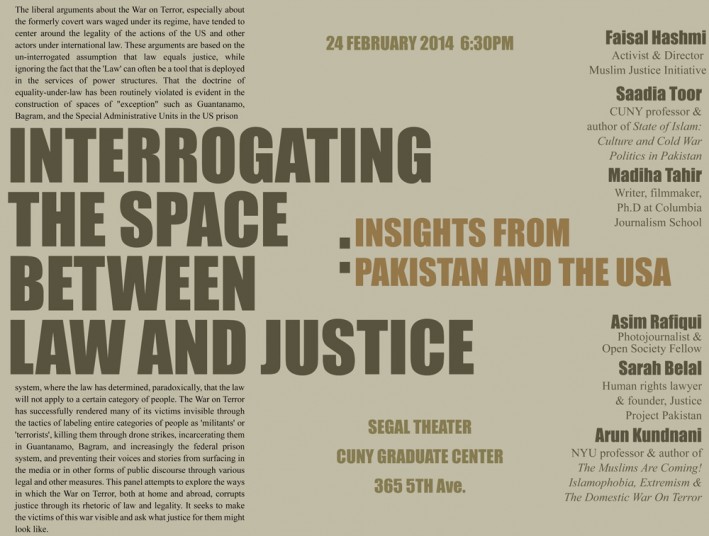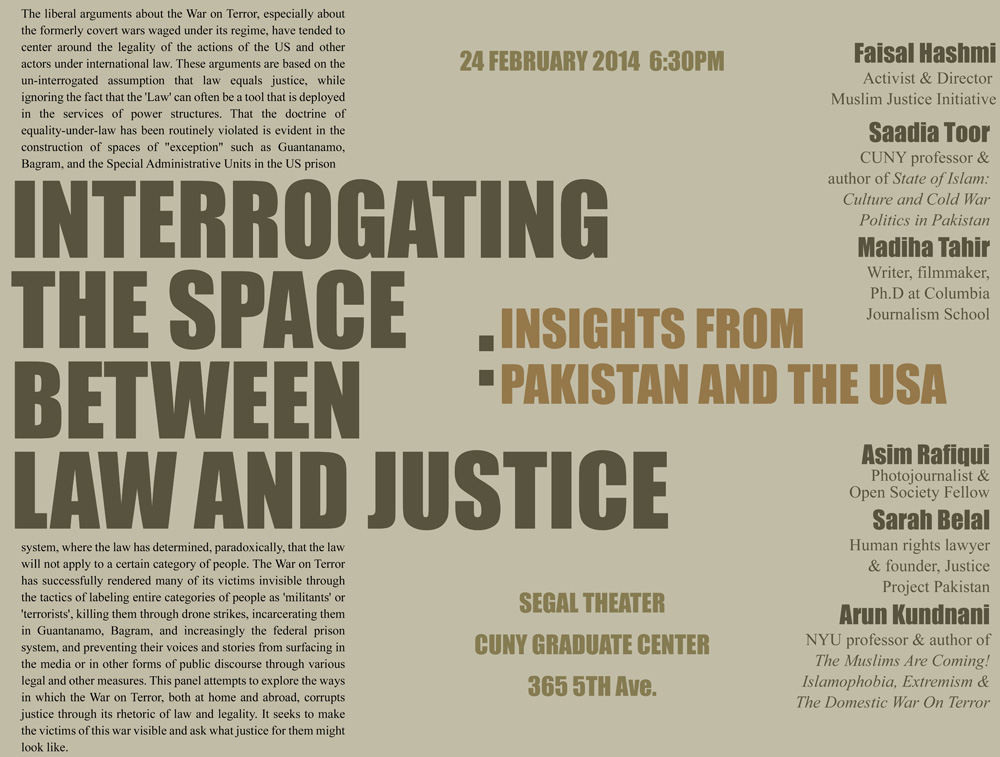Panel discussion with Sarah Belal, Faisal Hashmi, Arun Kundnani, Asim Rafiqui, Madiha Tahir, and Saadia Toor.
February 24, 2014
6:30-8:30pm
Segal Theater, CUNY GC
The liberal arguments about the War on Terror, especially about the formerly covert wars waged under its regime, have tended to center around the legality of the actions of the US and other actors under international law. These arguments are based on the un-interrogated assumption that law equals justice, while ignoring the fact that the ‘Law’ can often be a tool that is deployed in the services of power structures. That the doctrine of equality-under-law has been routinely violated is evident in the construction of spaces of “exception” such as Guantanamo, Bagram, and the Special Administrative Units in the US prison system, where the law has determined, paradoxically, that the law will not apply to a certain category of people. The War on Terror has successfully rendered many of its victims invisible through the tactics of labeling entire categories of people as ‘militants’ or ‘terrorists’, killing them through drone strikes, incarcerating them in Guantanamo, Bagram, and increasingly the federal prison system, and preventing their voices and stories from surfacing in the media or in other forms of public discourse through various legal and other measures. This panel attempts to explore the ways in which the War on Terror, both at home and abroad, corrupts justice through its rhetoric of law and legality. It seeks to make the victims of this war visible and ask what justice for them might look like.
Sarah Belal is a prominent Pakistani human rights lawyer who has been working to get Bagram prisoners released. Her organization Justice Project Pakistan has been litigating on behalf of families of prisoners. She is also a fellow with Reprieve, the UK-based human rights organization.
Faisal Hashmi is the former Executive Director of the Muslim Justice Initiative. He has been an activist in the area of Civil Liberties for Muslims in America, advocating on behalf of terror defendants caught up in the dragnet of cases in the federal criminal justice system post 9-11 .
Arun Kundnani is the author of The Muslims are Coming! Islamophobia, Extremism, and the Domestic War on Terror (Verso, 2014) and teaches in the Media, Culture, and Communication department at New York University.
Asim Rafiqui is an photojournalist who has been investigating human rights issues in Pakistan. His most recent project covers the lives and stories of Pakistani prisoners in the US prison at Bagram. Rafiqui is also a fellow at the Open Society Foundation.
Madiha Tahir is an independent journalist who recently produced a short documentary, Wounds of Waziristan, about Pakistani survivors of drone attacks. She is co-editor of a collection of essays, Dispatches from Pakistan and a Ph.D. candidate at Columbia University.
Saadia Toor is the author of State of Islam: Culture and Cold War Politics in Pakistan. She is Associate Professor of sociology at the College of Staten Island, CUNY and works on people’s movements in Pakistan.
Co-sponsored by the Center for Place, Culture and Politics and the Pakistan Solidarity Network



